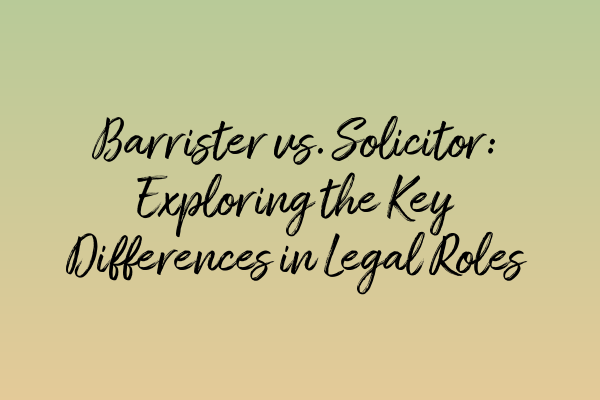Barrister vs. Solicitor: Exploring the Key Differences in Legal Roles
When it comes to the legal profession, there are two primary roles that individuals can pursue: barristers and solicitors. While both are legal professionals, they have distinct responsibilities and play different roles within the legal system. In this article, we will explore the key differences between barristers and solicitors, shedding light on their unique roles and shedding light on their unique contributions to the legal field.
Let’s dive in!
1. Education and Training:
To become a barrister, individuals must first complete a law degree or an unrelated degree followed by a conversion course. Once the academic requirements are met, aspiring barristers must undertake the Bar Professional Training Course (BPTC) before they can commence pupillage.
On the other hand, to become a solicitor, individuals must also complete a law degree or an unrelated degree followed by a conversion course. However, rather than the BPTC, solicitors must complete the Legal Practice Course (LPC) before they can embark on a training contract.
To get an in-depth understanding of the Bar Professional Training Course (BPTC), check out our related article [A Closer Look at the Bar Professional Training Course (BPTC)].
2. Advocacy vs. Legal Advice:
One of the key differences between barristers and solicitors lies in their primary roles within the legal system. Barristers are primarily advocates, representing clients in court, and providing specialist legal advice. They are typically instructed by solicitors to advocate for their clients during court proceedings and provide opinions on legal matters.
Solicitors, on the other hand, are legal advisors who provide general legal advice and guidance to their clients. They handle a wide range of legal matters, such as drafting contracts, negotiating settlements, and providing non-contentious legal services. Solicitors work directly with clients, manage their cases, and represent them in non-contentious legal matters.
3. Court Representation:
Barristers are generally the go-to professionals when it comes to court representation. They are skilled in courtroom advocacy, presenting arguments, cross-examining witnesses, and providing legal expertise in more complex and challenging cases. Barristers are often called upon when a case requires specialized knowledge, such as in criminal trials, family law matters, and complex commercial disputes.
On the other hand, solicitors usually handle the majority of legal matters outside of the courtroom. They provide legal advice, negotiate settlements, and handle legal paperwork. While solicitors can also represent clients in certain court proceedings, they primarily work with barristers for expert advocacy.
4. Client Interaction:
Solicitors typically have more direct contact with clients compared to barristers. They act as the main point of contact, gather evidence, give advice, and guide clients throughout the legal process. Solicitors develop a deep understanding of their clients’ cases and strive to build a strong rapport with them.
Barristers, however, usually have limited direct interaction with clients. They are primarily instructed by solicitors who act as a bridge between the client and the barrister. Barristers provide legal opinions and advocacy services to solicitors, giving specialized advice, and representing clients in court when required.
5. Hierarchy and Structure:
The legal profession has long been associated with a hierarchical structure, and this is particularly evident in the distinction between barristers and solicitors. Barristers are often seen as occupying a higher status within the legal profession due to their specialized legal knowledge and courtroom advocacy skills. They are usually self-employed or work in barristers’ chambers.
Solicitors, on the other hand, are typically employed within law firms and operate within a more corporate structure. They have a broader range of responsibilities, providing legal advice, managing cases, and building relationships with clients. Solicitors often work alongside other legal professionals, such as legal executives and paralegals.
To gain insights into the role of technology in modern legal practice, take a look at our related article [The Role of Technology in Modern Legal Practice].
In conclusion, both barristers and solicitors play crucial roles within the legal profession, with distinct responsibilities and areas of expertise. While barristers excel in courtroom advocacy and specialist legal advice, solicitors provide general legal advice, handle non-contentious matters, and manage client relationships.
To learn more about prominent law firms in the UK, check out our related article [A Look into Prominent Law Firms in the UK].
At Become Solicitor SRA, we understand the complexities of the legal profession and are dedicated to helping aspiring solicitors navigate their career paths. We provide guidance, support, and resources to help individuals achieve their dreams of becoming successful solicitors.
Have any misconceptions about solicitors that you’d like us to debunk? Discover the truth in our related article [Debunking Common Misconceptions about Solicitors].
And don’t forget the importance of networking as a solicitor! Check out our article on [Networking Strategies for Solicitors: Building a Strong Professional Network].
If you have any questions or would like to learn more about how we can assist you in your journey to becoming a solicitor, don’t hesitate to reach out to us. We are here to help you every step of the way.
Note: This blog post is for informational purposes only and should not be construed as legal advice. Please consult with a qualified solicitor for professional advice tailored to your specific situation.


Leave a Reply